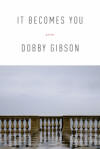It Becomes You
Dobby Gibson’s newest collection, It Becomes You, is his third book of poetry. His poems remind me of Billy Collins or Mark Strand: conversational and witty with themes of nostalgia and doubt. At their best, they reflect the sharp humor of Auden, who makes tight lines appear effortlessly conversational. From W. H. Auden’s “The Unknown Citizen”: “Was he free? Was he happy? The question is absurd: / Had anything been wrong, we should certainly have heard.” Gibson’s best poems aspire to this same kind of detached philosophical clarity. He generally succeeds, but without the formal aesthetic pleasure.
Dobby Gibson’s newest collection, It Becomes You, is his third book of poetry. His poems remind me of Billy Collins or Mark Strand: conversational and witty with themes of nostalgia and doubt. At their best, they reflect the sharp humor of Auden, who makes tight lines appear effortlessly conversational. From W. H. Auden’s “The Unknown Citizen”: “Was he free? Was he happy? The question is absurd: / Had anything been wrong, we should certainly have heard.” Gibson’s best poems aspire to this same kind of detached philosophical clarity. He generally succeeds, but without the formal aesthetic pleasure.
Gibson calls on the Twin Cities for the time-tangled sequences his poems lead us through. He calls on the snows of the upper Midwest to evoke the tacit loneliness in his poems. He does this with wit and precise observation, all the while remaining detached. His poems are full of windshields, separating the speaker from the thing which is being observed:
At night, when the windshield darkens
and that strange state comes over me,
I drift from the present and into the great past,
back to a time before there was a man
to believe the moon was a man,
or a lone bone to comb a child’s hair.
I’ve been thinking quite a bit about time lately, so I find it interesting to discover the ways in which others ponder our temporal relationships. In Gibson’s poetry, we are not caught in a moment, but in many moments simultaneously. An abundance of images melds into a chaotic version of being aware of multiple times. He seems to be reflecting on the past and imagining the future simultaneously:
You can’t change the past,
but in that past you could have changed the present,
so in the future you’re going to wish
you did something different now.
Once we become acclimated to this timeless flux, we can begin to appreciate the clarity of Gibson’s images and to align them with ideas. From “Waking in Someone Else’s Clothes” to “Charity Water,” the bombardment of images and confusion in time finally give way to thoughts and ideas captured in moments; a cohesion, a continuity of meaning, begins to develop:
we can relax a little and wonder whether
this is how the infinite begins,
. . . . . . . . . . . . . . . . . . . . . .
for though this is no longer sleep,
it still feels like something to wake from
Gibson uses winter in Minnesota, particularly the way our traces in the snow tell stories of solitude and unease, to build a sense of loneliness. Snow “paratroops” in, weighs down the glacier, erases our tracks, “smells exactly like nothing,” reminds us of ghosts, and holds together his house with its weight:
Stepping out into the snow, you feel cold.
Then you become the cold.
. . . . . . . . . . . . . . . . . . . .
Only later will you assess your burdens,
Looking back in the opposite direction
in which you’re finally moving,
thinking now, this way:
two ruts define the snow road,
each exactly one tire wide.
A handful of character prose poems with provocative names imply self-consciousness of the speakers. “The Archeologists” is an observation of the ways people interact with others while only thinking about themselves. “The Pilot” and “The Explorer” each present a particular way of interacting in the world. These prose poems exist in a moment differently than the verse poems, and offer immediacy, because Gibson has allowed the voice of another to speak clearly in the present. These poems offer a glimpse of the real connection possible when Gibson wants to focus on one thing. Unfortunately, this is not how he approaches his verse. Awash in intriguing images, lost in thoughts of time, grasping for elusive meaning: I want to believe he will find a way to convey in verse another simple truth about his complex world.
Then there are the wonderful “40 Fortunes,” which originally appeared as a chapbook. Some favorites:
Desert crossings are impressive only if the desert has been given an ominous name. Go forth and name your deserts.
Do not reveal your deceit lest you reduce it to mere crime.
The dream state is the only beautiful form of suffocation.
I expect Mr. Gibson will write another book. Perhaps in that one he will step out from behind the screen.





